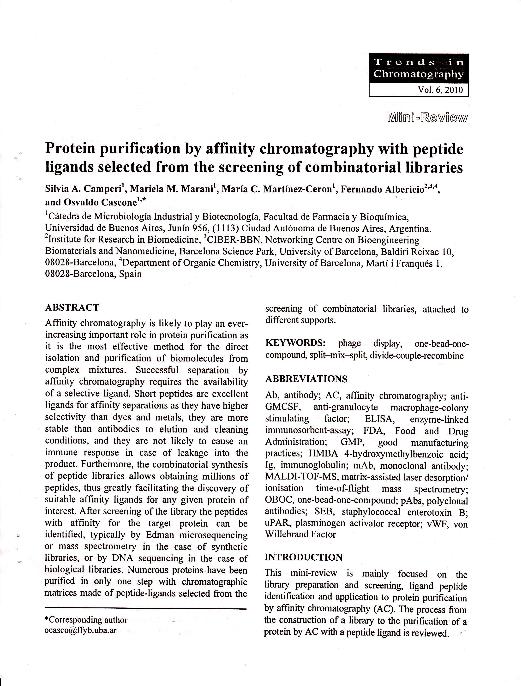Mostrar el registro sencillo del ítem
dc.contributor.author
Camperi, Silvia Andrea

dc.contributor.author
Marani, Mariela Mirta

dc.contributor.author
Martínez Ceron, María Camila

dc.contributor.author
Albericio, Fernando
dc.contributor.author
Cascone, Osvaldo

dc.date.available
2017-03-29T23:40:06Z
dc.date.issued
2010-12
dc.identifier.citation
Camperi, Silvia Andrea; Marani, Mariela Mirta; Martínez Ceron, María Camila; Albericio, Fernando; Cascone, Osvaldo; Protein purification by affinity chromatography with peptide ligands selected from the screening of combinatorial libraries; Research Trends; Trends in Chromatography; 6; 12-2010; 11-22
dc.identifier.issn
0972-8635
dc.identifier.uri
http://hdl.handle.net/11336/14495
dc.description.abstract
Affinity chromatography is likely to play an everincreasing important role in protein purification as it is the most effective method for the direct isolation and purification of biomolecules from complex mixtures. Successful separation by affinity chromatography requires the availability of a selective ligand. Short peptides are excellent ligands for affinity separations as they have higher selectivity than dyes and metals, they are more stable than antibodies to elution and cleaning conditions, and they are not likely to cause an immune response in case of leakage into the product. Furthermore, the combinatorial synthesis of peptide libraries allows obtaining millions of peptides, thus greatly facilitating the discovery of suitable affinity ligands for any given protein of interest. After screening of the library the peptides with affinity for the target protein can be identified, typically by Edman microsequencing or mass spectrometry in the case of synthetic libraries, or by DNA sequencing in the case of biological libraries. Numerous proteins have been purified in only one step with chromatographic matrices made of peptide-ligands selected from the screening of combinatorial libraries, attached to different supports.
dc.format
application/pdf
dc.language.iso
eng
dc.publisher
Research Trends
dc.rights
info:eu-repo/semantics/openAccess
dc.rights.uri
https://creativecommons.org/licenses/by-nc-sa/2.5/ar/
dc.subject
Phage Display
dc.subject
One Bead One Compound
dc.subject
Split Mix Split
dc.subject
Divide Couple Recombine
dc.subject
Purification
dc.subject
Combinatorial Library
dc.subject
Peptide
dc.subject
Chromatography
dc.subject.classification
Otras Ingenierías y Tecnologías

dc.subject.classification
Otras Ingenierías y Tecnologías

dc.subject.classification
INGENIERÍAS Y TECNOLOGÍAS

dc.title
Protein purification by affinity chromatography with peptide ligands selected from the screening of combinatorial libraries
dc.type
info:eu-repo/semantics/article
dc.type
info:ar-repo/semantics/artículo
dc.type
info:eu-repo/semantics/publishedVersion
dc.date.updated
2017-03-21T20:11:58Z
dc.journal.volume
6
dc.journal.pagination
11-22
dc.journal.pais
India

dc.journal.ciudad
Kerala
dc.description.fil
Fil: Camperi, Silvia Andrea. Universidad de Buenos Aires. Facultad de Farmacia y Bioquímica. Departamento de Microbiología, Inmunología y Biotecnología. Cátedra de Microbiología Industrial y Biotecnología; Argentina. Consejo Nacional de Investigaciones Científicas y Técnicas; Argentina
dc.description.fil
Fil: Marani, Mariela Mirta. Universidad de Buenos Aires. Facultad de Farmacia y Bioquímica. Departamento de Microbiología, Inmunología y Biotecnología. Cátedra de Microbiología Industrial y Biotecnología; Argentina. Consejo Nacional de Investigaciones Científicas y Técnicas; Argentina
dc.description.fil
Fil: Martínez Ceron, María Camila. Universidad de Buenos Aires. Facultad de Farmacia y Bioquímica. Departamento de Microbiología, Inmunología y Biotecnología. Cátedra de Microbiología Industrial y Biotecnología; Argentina. Consejo Nacional de Investigaciones Científicas y Técnicas; Argentina
dc.description.fil
Fil: Albericio, Fernando. Universidad de Barcelona; España
dc.description.fil
Fil: Cascone, Osvaldo. Universidad de Buenos Aires. Facultad de Farmacia y Bioquímica. Departamento de Microbiología, Inmunología y Biotecnología. Cátedra de Microbiología Industrial y Biotecnología; Argentina. Consejo Nacional de Investigaciones Científicas y Técnicas; Argentina
dc.journal.title
Trends in Chromatography
dc.relation.alternativeid
info:eu-repo/semantics/altIdentifier/url/http://www.researchtrends.net/tia/abstract.asp?in=0&vn=6&tid=60&aid=3090&pub=2010&type=3
Archivos asociados
